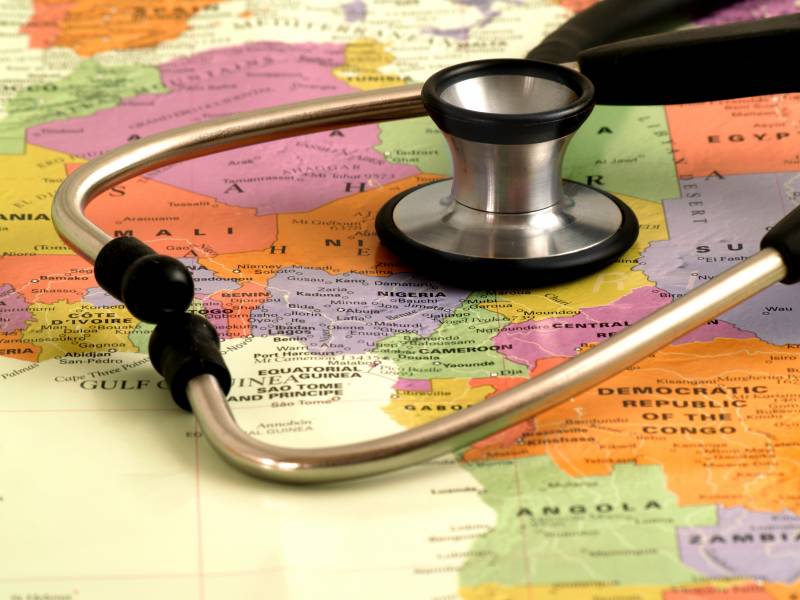A LOCAL NHS chief has called on people to think carefully before travelling abroad for medical treatment.
David Crichton, Chief Medical Officer, NHS South Yorkshire has urged people to understand the full details and risks before going abroad for medical treatments and procedures.
Travelling abroad for treatment is becoming more common with thousands opting to go overseas for treatments such as cosmetic and weight loss surgery, dental procedures and fertility treatments.
Before embarking on having medical treatment in another country, Dr Crichton said it is important to get as much information as possible about your treatment options and especially follow-up so that you can make an informed choice.
Dr Crichton said: “Treatments abroad are becoming more popular as they are often seen as a cheaper, faster solution to the NHS or paying privately in the UK.
“Within GP practices, we are seeing a rise in patients requiring ongoing care from treatments abroad, some of which need specialist follow-up, not routinely available on the NHS.
"All types of medical treatment involve some element of risk and complications can occur regardless of where in the world you receive treatment, however the risk of complications increases considerably with travel, especially without adequate aftercare once back in the UK.
“We are asking patients to carefully research medical providers abroad and understand the care you will receive before and after the treatment, including risks of complications after having medical treatment outside of the UK.
"Individuals planning treatment abroad should ideally discuss any planned procedures with their GP and/or specialist before making any final decisions.
“It is essential that patients fully understand what is involved as careful planning and preparing can help reduce risks associated with treatment abroad.”
It is important to note NHS services are available should any emergency treatment be required, arising from treatment, wherever it was performed.
NHS England have issued guidance about going abroad for medical treatment and have developed a checklist for patients to use before making a decision about treatment abroad.
Treatment abroad checklist
All types of medical treatment involve some element of risk. It's important to get as much information as possible about your treatment options so that you can make informed choices.
Read the guidance about going abroad for medical treatment and go through the checklist before making a decision. Think about your reasons for going abroad
Make sure your decision is based on the quality of the medical care you would like to receive and not on how appealing the destination seems for a holiday.
Know the warning signs
Think carefully before booking any treatment abroad if there is:
A hard sell
A lack of information
Pressure to make a quick decision
No discussion of possible complications
No mention of aftercare
Get a second opinion
Have you spoken to a GP, dentist or clinician? There are several reasons why it's a good idea to involve a doctor in your decision.
A doctor can give you a valuable second opinion as well as advice about treatment options and whether it's necessary. As the doctor could be involved in your aftercare, discuss with them how to transfer medical notes to the overseas team.
Do your research
Ask yourself:
• Have you checked the qualifications of the medical team treating you?
• Have you been able to ask them questions about your treatment?
• Are you satisfied with the facilities and standards at the clinic or hospital where you'll be treated?
Check if you can get funding for treatment abroad
Before considering paying for treatment abroad yourself, find out if you're eligible to receive funding for planned treatment in Europe.
If you decide to proceed with self-funded treatment abroad, you may want to think about why it's not available here.
For reassurance, consider:
• whether the treatment is licensed by the Medicines and Healthcare products Regulatory Agency (MHRA)
• whether the treatment is approved by the National Institute for Health and Care Excellence (NICE)
• whether the treatment is being offered as part of medical research listed within the international clinical trials database information from sources other than from the organisation offering you the treatment abroad. This could help you to verify what you're being told by whoever is offering the treatment. It may also provide you with questions you would want to ask the chosen treatment provider
Aftercare and possible side effects or complications
Make sure you understand the possible complications and side effects that could arise from your treatment.
Ensure you're clear about how your aftercare will be coordinated. You should stay in the country where you’ve had treatment for a suitable length of time to recover before travelling home.
Do the maths
If your main reason for going abroad is to save money, make sure you've factored in fluctuating exchange rates, the possibility of extending your stay if necessary and the cost of possible return trips.
If you're expecting the NHS to fund your planned treatment in an EU country or Switzerland, it's also important that you've checked your entitlement and applied for funding in advance of treatment.Check you're sufficiently insured
Before travelling abroad for treatment:
• make sure you have appropriate travel insurance
• tell your insurer about your plans to have treatment abroad
Get prior authorisation from the NHS
You should always apply for funding before travelling abroad to ensure you understand your entitlement before starting any planned treatment.
It can take up to 20 working days for an application to be processed and a decision to be made. However, it may take longer if your application is not complete and additional information is required.
Reimbursement for dental treatment
You cannot get reimbursement for dental treatment.
• Find out about NHS dental services in England
• Find out if you can get help with dental costs in England
Reimbursement for treatment on a cruise ship
Treatment required during a cruise is not covered under any healthcare agreement that the UK has with other countries in the world, including EEA countries.
You may be able to claim money back for dialysis on board cruise ships within EEA boundaries.
Read the section "Funding for dialysis abroad" and speak to your UK dialysis coordinator first.Funding for dialysis abroad
A European Health Insurance Card (EHIC) or Global Health Insurance Card (GHIC) covers the provision of oxygen, renal dialysis and routine medical care, but you'll have to arrange and book medical treatment before you go.
You should always consult your GP or hospital before travelling. Make sure you're not booked with a private healthcare provider, as these are not covered by the EHIC or GHIC.
You'll also need to speak to the coordinator in your UK dialysis unit, who will contact the dialysis unit where you’ll be staying in the EU or Switzerland.
Find renal units on the UK Kidney Association website
Ensure you make your arrangements according to your UK schedule. There may also be different guidance depending on what type of dialysis you receive. Speak to your doctor before you travel.
Dialysis outside the EU
Dialysis is not routinely funded by the NHS for patients travelling to a country outside the EU and Switzerland. For more information, please contact NHS England england.contactus@nhs.net.
Funding for vaccinations
You cannot get funding for vaccinations. Funding is only available for pre-planned medically necessary treatment and not preventative measures such as vaccinations or immunisations.
Travel and accommodation costs
NHS England does not reimburse travel and accommodation costs that you incur while getting medical treatment in an EU country or Switzerland. You must pay for them yourself.


















